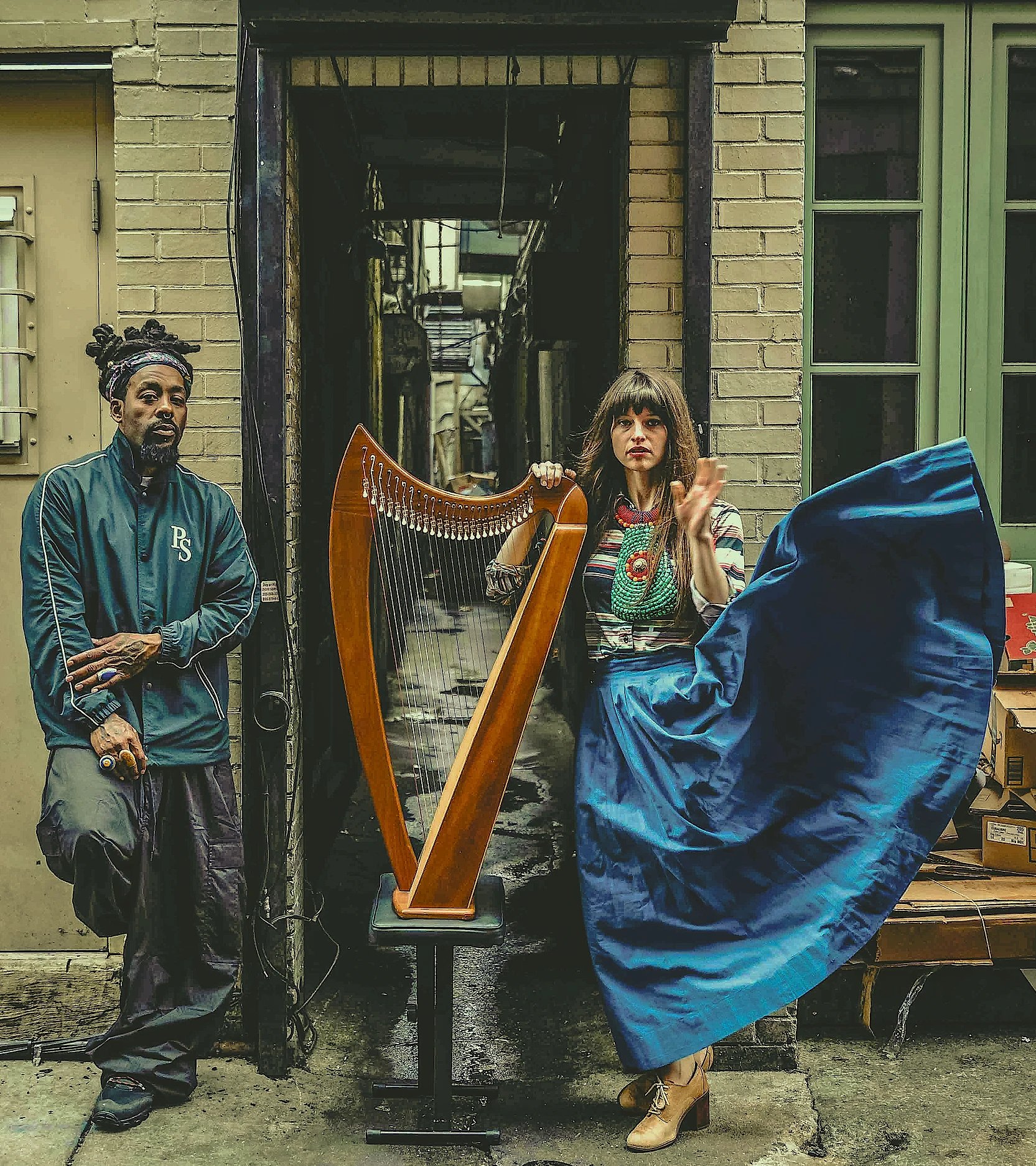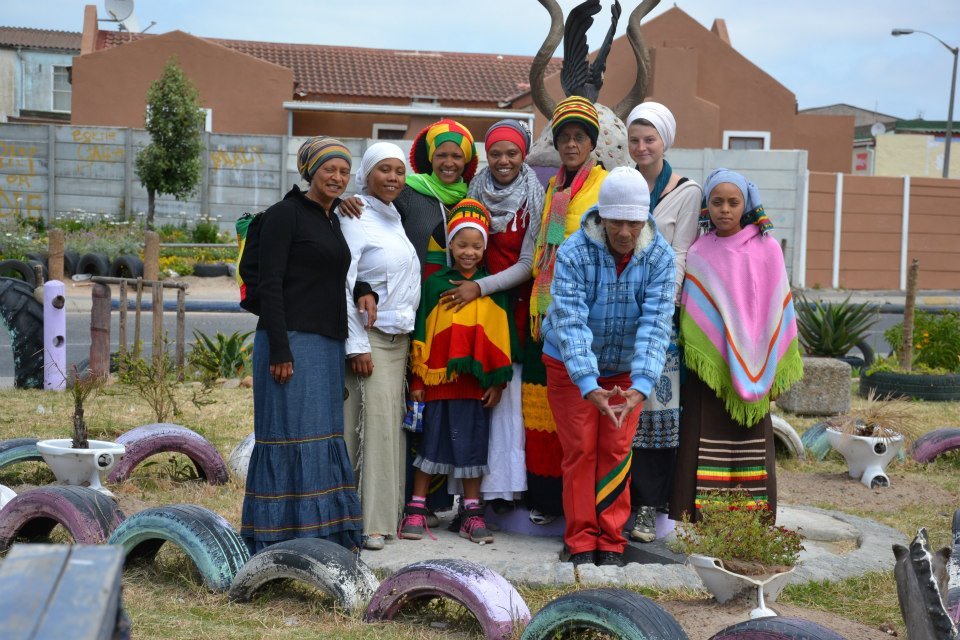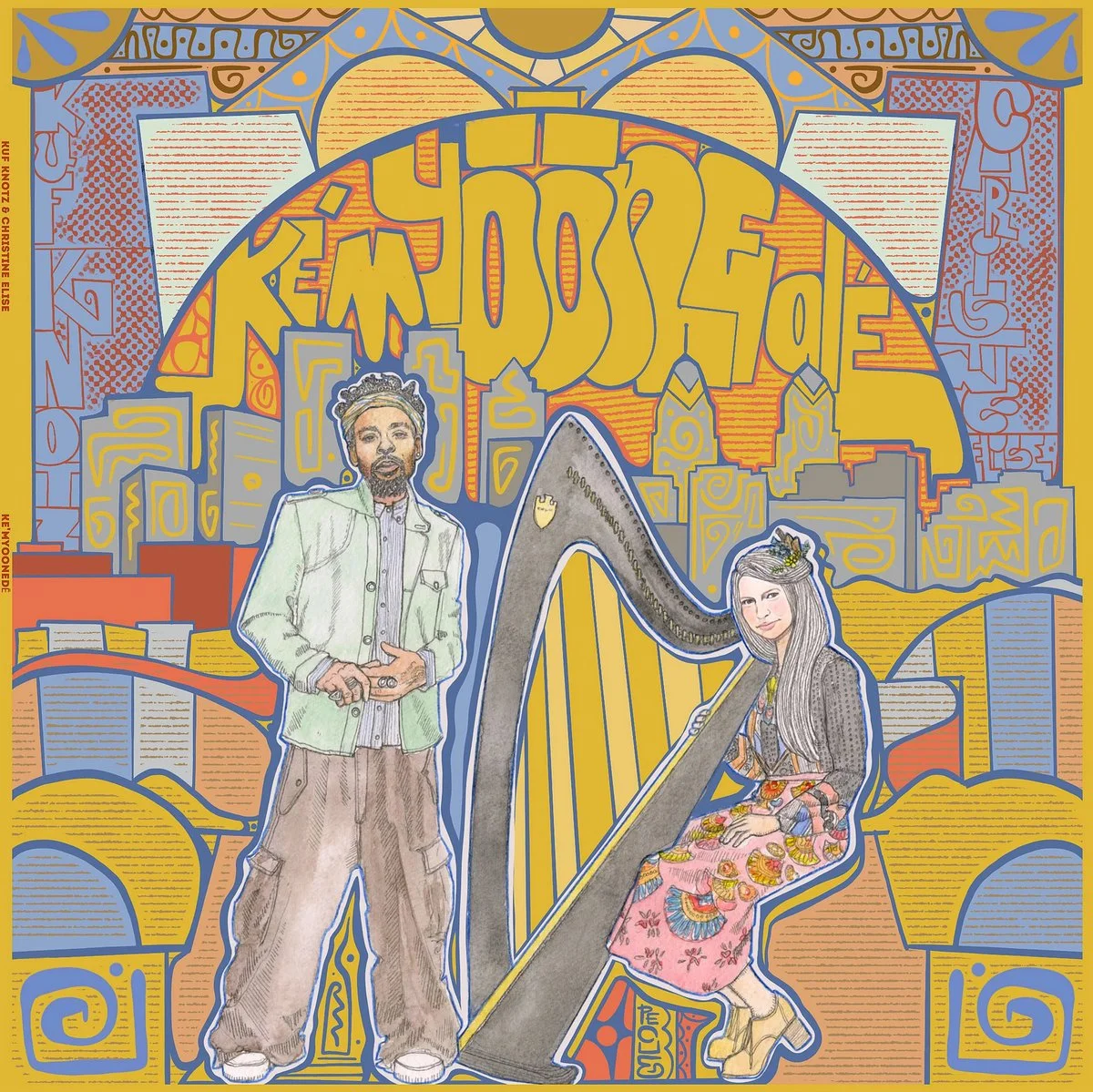This Too Shall Pass: A chat with Küf Knotz & Christine Elise
Photo by Jovell Rennie
Küf Knotz is a producer, MC, and songwriter. Christine Elise is a harpist, vocalist, and music therapist. As a duo, their work truly offers something for everyone—fans of Dorothy Ashby, Joanna Newsom, and Grand Puba would leave a gig equally happy. Their practice combines studio recording, live performance, and community engagement, and we’re pleased to announce that the duo’s coming back to Myrtle on November 1st. Free show!
The Well (TW): Your recent gig at Myrtle—we had a blast! As such, we’re really happy to be taking this time to get to know you a bit deeper. Let’s start at the start—where did you get the music bug?
Küf Knotz (KK): For me, it was for sure creating a song in my dorm room that I actually thought sounded decent. I had tried recording and making songs before, but this one time the creation seemed to hold something special; it felt like I could share it with the public. Before this moment, all my creations were just kept for me.
Christine Elise (CE): I can remember being in my grandmother's living room in Avon-by-the-Sea, New Jersey. She witnessed that I was fascinated by her player-piano; she sat with me and taped names of the notes to the keys and in that moment, it opened my eyes to being a musical being.
TW: Grandma power is real! What was growing and family like?
KK: Growing up was a mix of happiness, and what felt like rough times. For the most part my mother and grandmother raised me and I would visit my dad on the weekends. I think that was the rough part, going through the motions of Dad not living with us. I was very into sports growing up and played little league football, basketball up until middle school. Then in middle and high, I joined the school teams. Once I started college, I pretty much forgot about sports and dove deep into music.
CE: My family was very supportive of my interest in music. It wasn't something that came easy to me—however I was adamant about practicing piano and often would compete with the TV, banging on the keys, repeating the same phrases over and over, with CSI blaring in the background. I started playing harp freshman year of high school. As a teenager, I struggled with mental health; having lived in an institution for a year, music helped me stay grounded and connected to the present, saving my life.
TW: Küf, do you see any relationship between sports and music?
KK: Yes for sure. I think for music and life, sports gave me understanding. It shaped my outlook on how important teamwork is and how important it is to find your strengths. When you solely focus on your strength and let everyone you work with focus on theirs, then when combined it’s a powerful team. Along with that comes supporting each member of the team and building their confidence up. Sports and music both involve physical endurance. You always want to be in the best shape possible not only to maintain longevity at performing, but also to be pleasing to the eye as that for sure adds to performances and captures people's attention.
TW: And Christine, going back to Avon-by-the-Sea; did you spend a lot of time around Ashbury Park in your youth? If so, what was that like for you / any memorable concerts?
CE: Yes, I did spend some time in Asbury Park, NJ as a kid. Through that experience, I have witnessed the area change a lot over the years. Asbury is much different now. The arts are vibrant, people come in flocks to visit during the summer, and rent is rapidly increasing. Some changes are for the better and some are for the worse; however, every place has room to grow! When I was a kid, the boardwalk would be vacant and the beach wide open as far as you could see. The amusement park buildings laid desolate with some added art to their walls. I would occasionally attend shows at the legendary Stone Pony and walk around to take artistic photos to capture moments of what felt like a city of ruins. I can remember standing in front of a washout mural that stated, “This Too Shall Pass” in black and yellow against a light blue painted wall. I had a long corduroy coat on with a small fur collar and bell bottom jeans. One leg was pushed up against the wall and my head turned in the other direction. Although this was a message to the community, it was a message to me as a teenager that I resonated with, creating a ripple effect. It’s interesting to see things change and as time passes, witness more of it.
TW: Hearing 'harp' and 'hip hop' together, one might think of Dorthy Ashby's Afro-Harping—as like, an origin story record. Is her work an influence?
KK: Funny, we are asked that a lot, but I didn’t know of Dorthy Ashby until I started performing with Christine. People started asking me if I liked her, so I had to go look her up and listen to her albums.
Küf and collaborators backstage at dB’s in Utrecht, NL
TW: How about Joanna Newsom? Not just because of the harp, but we kinda hear a little of her in Christine's vocals on songs like New Day, too.
CE: Joanna Newsom was definitely an influence of mine. My great aunt, Carol DeLuise, was an actress and lived in LA. She often would hear about upcoming artists and talk about those that influenced her. One day of 2004, I received a letter from her in the mail that had a newspaper article clipping in it. It was about a new artist who played harp and sang with a unique vocal style. She thought of me as I had been taking lessons for about a year now at this point. I didn’t think about it much other than it was a nice gesture to think of me and go through the effort of sending it. I had no way of listening to her music at the time as this was before music was easily accessible through streaming platforms. It wasn’t until college that her name surfaced again and I began to listen to her work. I was enamored by her tone and although edgy at times, it was something I wanted to keep hearing! She grew on me in a beautiful way. Once I made the connection that ten years prior I was already introduced to her, it came full circle.
TW: Have you done any touring outside the US?
KK: The Netherlands was the furthest from home I have traveled. I went to be with my now ex-girlfriend and ended up doing music while I lived there. I learned that the Dutch are very blunt and upfront. I also learned that America is pretty far behind on a lot of basic things that could really help humans living here in the states.
TW: Such as?
KK: I think the US can benefit from the way the government runs things there. For example, free health care and college are staples to mental and physical health. Money is handled differently. Though poverty exists everywhere in the world, the poverty there looks a lot different than the poverty here, with a much lower rate of it. I think the brashness of the Dutch is admirable as well. At first I really had to adjust and get used to it, but the bluntness of their interaction felt better than some interactions that feel fake.
Above: Christine at the piano; young Küf with his cousins
TW: Christine, how about you?
CE: The furthest that I have traveled from home is South Africa. In 2013, I completed a 10 month internship in Cape Town, studying a specific type of music therapy that they implement called Community Music Therapy. I learned so much during this journey. One of the biggest lessons I learned is that as an educator, it is more important to listen and hear someone's perspective, asking about their story before beginning to teach. Teaching and learning can be interchangeable.
TW: We’re new to Community Music Therapy. What does that entail; how it's practiced?
CE: During the time I was studying, Community Music Therapy was not a popular model of music therapy in the states. I could not find an organization or practice to learn about it. It was mentioned in my textbooks a few times, but they never really dove into its essence. I was intrigued and wanted to learn more! As I began to understand, I realized that the reason I did not see this practice implemented was because the systems in America are very “I” centered. When one thinks of attending counseling in the states a sterile room with a couch or a chair is imagined and the person comes to the therapist with their “concerns.” The imagery that comes to mind is a person holding an overwhelming pile of books that have become solely their “problems” to hold. Well, these books all have pages filled with stories, experiences, and exchanges as to how they got in the hands of the holder. This approach, community music therapy, unpacks this weight and examines a little further, questioning “Does the environment, people around, culture, community have influence on these challenges?”
If so, the weight is already shifted to a larger lease. In community music therapy, there is a lot of group work, cross generational engagement, performing to share stories and increase confidence, all using music in some shape or form. It can occur in community centers, libraries, schools, outpatient programs, and public spaces. One does not have to be a musician to engage in this creative expressive work. The mission is to feel centered with the environment and to uplift the community as well. When I was leading a school choir, one of the students shared with me, “My parents never knew I could perform. They saw me on the stage and said, “Wow, you did amazing!” This was the first time they ever gave me a compliment versus yelling at me for something I did wrong.” The performance experience helped the parents see their child in a different light, changing their perspective and breaking a part of the cycle. This is just one example!
TW: Very cool! Sort of related, have you two got any healthy habits that are central to your practice?
KK: I am aiming to find a very diverse yet high in protein way of eating. I think being in motion and traveling often truly inspires and helps with creating art. I feel a certain creative push whenever on the road.
CE: Playing the harp can be taxing on the body, specifically the neck and back. I am working on finding a daily route to help strengthen and stretch, increasing the longevity of playing the instrument. I also find nature to be inspiring. When taking the time to observe and listen, I am easily inspired by shapes, patterns, movement, etc. It could be the wind moving on water, a spider making a web, a pattern in the soil, sounds of the birds, and many more. This has helped to create poems as well as melodic phrases and rhymes used to compose.
Christine with Community Music Therapy practitioners
TW: Can we talk about the business a bit? How are you getting by; what’s the larger scope of this collaboration?
KK: Music is my full time job. Yes, I am getting by, but it's still a gig to gig type of living, which I believe is comparable to 9 to 5'ers that live check to check. I think not having a specific amount attached to a weekly or monthly pay period throws some people off and may make it seem like a less glorious job than what it really is, but as long as you stay creative and frugal you can make it work. I find it is equally important to enjoy the journey while building your career.
We also wanted to increase our engagement in the community in addition to performing at evening music venues. This has led to creating events and workshops, often family friendly DIY style, at libraries, yoga studies, schools, book stores, community centers, parks etc. We’re aiming to make music accessible to all. [Here’s more info about Higher Grounds Music]
TW: We’re reading on the Higher Ground page you two opened for Slick Rick? That moment when the snares kick in on Mona Lisa is like, one of the most recognizable moments in rap history.
KK: Yes! 100%!! That was for sure one of my highlights as an opening act. I grew up listening to Slick Rick as my older brother would always be playing him. Then as I got older, I started listening to him and fell in love with his flow and songs. A special moment it was, to open for Slick Rick.
TW: It got me wondering—what was the gear setup in your dorm room when you just got started
KK: I really had some basic rigged up equipment. I had a stereo with two tape decks, stereo receiver, headphones, and two Radio Shack microphones. I had beats in one tape deck and a blank in the other to record. We would write the raps then turn on the beats and plug the microphones into the outlets and go for it. It’s funny how much things have changed and how crazy technology is now!
TW: That’s great. More recently, you've worked with the producer Mecca:83—how'd you get linked up with a producer in the UK, and how do you seek out collaborators and producers generally?
KK: This is the result of one of the powerful parts of the internet haha. I was a fan of Mecca:83 and started following him on IG. Then one day, I just reached out and expressed how much I dug his work. He responded saying he dug my work as well. After this, I asked him to collaborate on a beat he made and he was all about it. It is still one of my favorite songs to date! So up until this album HYPNAGOGIA, we would work with other producers. Yep, I would seek out different people whose work we liked and see if they were open to collaborate. This new album we decided to produce everything ourselves and we really loved how it came out!
LP art for the duo’s release, Ké myōōnėdé [Community]
TW: No real segue here but—favorite tattoos?
KK: My pyramid and moon on my right arm. It is a dedication to my father who passed away in 1996.
CE: I don’t have many tattoos, but the two that I have are very special to me. One states, “Let Go and Let God.” I got this when I was 16. It is a beautiful reminder that, at times, letting go of things that I am powerless of or worry about can be healing and allow space for growth. The second one is a spiral that says “Forward Motion” on the bottom. The spiral has a few sporadic dots along its way from the middle to the end. These symbolize blocks or feelings of being “set back” on my life journey. It is a reminder that although I may take two steps back, I have taken many steps to get to the present. It has allowed me to change perspective on moments like these and encouraged me to push through them and continue to move forward.
TW: Second to last Q—you’re not from around here so, what’s your impression of greater Providence?
KK/CE: Our relationship to East Providence is one through performing. We haven't spent enough time in Rhode Island to know or have an in-depth understanding of the area; however, we do know that the circles we have come upon and met through performances have been very supportive and open minded.
TW: Promo time! What’s something coming up in the next 2-3 months you’d like to have on peoples’ radars?
KK/CE: We are currently touring our new album Hypnagogia for the rest of this year. It can be found on all digital platforms as well as vinyl, CD, and cassettes through our merch store. We will be mainly covering the east coast. This summer we will be passing through Providence to play Coast Fest 2024, August 3rd, in Falmouth, MA.
*
Catch Küf Knotz & Christine Elise right at Myrtle on Nov 1, 2024. Like all our shows, this one’s free.





